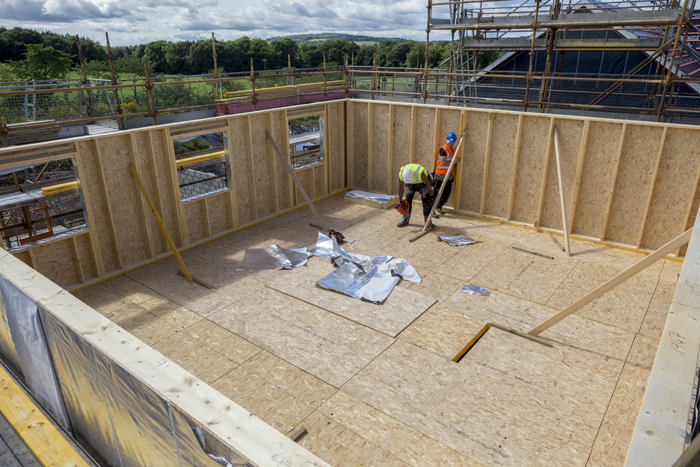Read the online magazine article here: https://buff.ly/31TBJkt
A £6 million collaborative research and development project aimed at industrialising new build homes has been launched.
Called AIMCH (Advanced Industrialised Methods for the Construction of Homes), the project aims to understand how to boost the off-site manufacture of houses, modernise housing building practices and bring down costs.
It is driven by a consortium led by one of the UK’s leading independent house builders and offsite timber build systems manufacturers, Stewart Milne Group based in Witney, Oxfordshire.
This major UK research and development project, funded through Innovate UK, is being led by Stewart Milne Group’s Director of Product Development, Stewart Dalgarno. The project’s industry partners include national housebuilder, Barratt Developments, social housing developer London and Quadrant Housing Trust, The Manufacturing Technology Centre in Coventry, Tarmac Trading, Forster Roofing and Construction Scotland Innovation Centre.
Meeting the challenge of building more homes
The UK needs an additional 120,000 homes each year. The housing sector faces many challenges, including an ageing workforce and poor productivity. Housing quality, customer satisfaction and building performance must improve says the government, which wants the housing industry to become a digitally integrated, manufacturing and assembly based industrialised sector.
AIMCH represents the UK’s largest private, rented and social housing providers, offsite manufacturers and UK researchers and the three-year project will develop concepts, prototype and trial solutions on live projects, driving wider adoption. The project’s learnings will be shared across the housing sector.
UK Research and Innovation Chief Executive Sir Mark Walport said: “Technologies being developed in the UK provide a significant opportunity to transform the way we build, such as the use of augmented reality to improve design or robotics to aid complex building assembly.
“Through such projects, the Industrial Strategy Challenge Fund allows us to catalyse innovation across the UK’s vital construction industry improving productivity, sustainability and safety.”
Bringing construction out of the Dark Ages
Much of the construction sector has been slow to embrace existing technology such as building management, offsite panelised systems and lean processes that could cost effectively speed up the number of homes built across the UK every year. Processes are still largely paper-based, but digital technology would reduce errors and increase efficiency.
Such technology is hardly cutting edge, so why hasn’t it been adopted by the construction industry before? According to Stewart Dalgarno at the Stewart Milne Group in Witney, it should have been. “We want to get digitally connected, from architect’s drawings through to finished homes. This is where our project consortium research partner, the Manufacturing Technology Centre in Coventry, can apply its expertise.
“The government needs more houses built, and to do that new ways of working are needed. We need to industrialise building rather than relying on craft-led skills. We need to embrace new ways of working. Industrialising means doing things smarter and more cost-effectively.” “Doing more in a factory rather than on site makes sense. In a factory it can be done more efficiently, requiring fewer skills. The more you can do cost-effectively in the factory, especially by using automation and robotics, the better the quality, output and cost will be.”
Currently it takes two skilled people on site around 25 minutes to fit a window. “In the factory, a window could be fitted every two to three minutes before the system is shipped to the site.”
Project consortium member, Forster Roofing is an ambitious SME (small or medium-sized enterprise), wanting to expand across the UK by manufacturing a kit of parts.
To do that it needs to develop design software, factory and installation processes to reduce site labour cost by up to 30 per cent.
“The investment by Innovate UK is helping the consortium work together to overcome challenges and accelerate mainstream solutions that would otherwise not happen,” added Stewart.
Can construction companies build more houses for less?
This project is a three-year flagship project for the housing industry. AIMCH is part of the government’s £170 million construction sector deal and the biggest grant awarded to the sector so far.
The main ambition is to deliver offsite panelised housing construction for the same cost or less than is currently the case.
The consortium will develop and trial a range of panelised offsite construction systems. Extensive monitoring of several UK residential developments will take place later this year to gather data on current and future practice, identifying opportunities, benchmarking and building the case for change. Stewart says this project isn’t about invention. “It’s about innovation, looking at what already exists which can be made to work better and brought into mainstream construction practice in a viable and deliverable way.”
He’s not talking about fully modular development either, which involves constructing an entire building offsite and installing prefabricated sections onsite. “We are talking near-to- market mainstream offsite panelised solutions. Fully mainstream modular houses remain a future ambition. We are not there yet.”
He added: “We want to accelerate innovation through new manufacturing techniques, bringing UK manufacturing back and creating high value jobs throughout the supply chain.”


